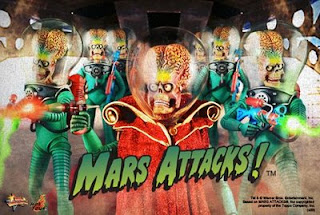When University of Washington scientists Peter Ward and Donald Brownlee published Rare Earth: Why Complex Life Is Uncommon in the Universe they de-Saganized our universe. I read it (1999), was convinced Carl Sagan was wrong, and saw that, most probably, there was no life elsewhere in the universe beyond a flatworm (beyond mono-cellular life). I haven't changed my mind on this.
Dennis Overbye has written a nice summary of where this discussion is at today: Hot on Trail of ‘Just Right’ Far-Off Planet. Here's what's up.
- The search is for an Earthlike planet, a planet in a "sweet spot known as the habitable zone — not too hot, not too cold — where water and thus perhaps life are possible. In short, a so-called Goldilocks planet fit to be inhabited by the biochemical likes of us."
- A Goldilocks planet will be wet and warm, a place where microbes can emerge. But far more than that is needed for the emergence of multicellular life, especially large creatures and creatures like us. "If you reran Earth’s history, how many times would you get animals?” asks astronomer Brownlee.
- Single-cell life might be common, says Marcy. "But," he adds, "the steady, long-term evolution toward critters that play improv saxophone, write alliteration poems, and build heavy-lifting rocket boosters may depend on a prohibitive list of planetary prerequisites.” Because even "wet and warm" is a rare condition.
- Note: we have two conditions mitigating against intelligent life in the universe outside of earth: 1) "Wet and warm" is a rare condition (based on the nature of the physical universe); and 2) given "wet and warm," how many times would intelligent animals evolve (based on the inherent difficulty of biological evolution)? (For the unlikelihood of that happening see, e.g., botanist William Burger's Perfect Planet, Clever Species: How Unique Are We?)
- What's the one ironclad requirement for habitability, for life? According to the National Academy of Sciences it's "a place warm enough for chemical reactions to go on. So, determining how warm a planet’s atmosphere keeps it — through assumptions, calculations or just plain guesses — has been crucial in reaching a verdict about its potential habitability."
- Do we have any potential Earthlike planets? Dr. Lisa Kaltenegger of the Max Planck Institute for Astronomy in Heidelberg "so far we only have two great targets to search for atmospheric signatures of life.” And the propects of those are bleak.
- Our abilities form a barrier to discovery. "The brute reality, astronomers admit, is that even if there are thousands or millions of habitable planets in the galaxy, only a few hundred of them are within range of any telescope that will be built in the conceivable future." (Note the underlying spirit of Carl Sagan.)
1) Complex life is very fragile, and can only exist in a habitable zone.
2) A habitable zone suitable for complex life has many rare earth factors that have come together and appear fine-tuned for complex life.
3) The odds of such factors coming together randomly is astronomical.
4) Therefore, intelligent life probably exists only on Earth and nowhere else in the universe
"“The question of whether the Earth is unique because of its water abundance is perhaps the most interesting one in the arsenal of Rare Earth arguments,” said Dr. [James] Kasting [of Penn State University], who explained that calculations showed that the planet could have easily had too much or too little water.
- "In other words, alien planets that have been lucky enough to be habitable in the first place might have to be lucky again. “The big hurdle” for other planets, said Dr. Brownlee, is to have some event or series of events to trigger their own “Cambrian-like” explosions."
Factor out God, and what does science give us? Overbye writes:
"Earth’s luck will run out. As the Sun ages it will get brighter, astronomers say, increasing the weathering and washing away of carbon dioxide. At the same time, as the interior of the Earth cools, volcanic activity will gradually subside, cutting off the replenishing of the greenhouse gas.
A billion years from now, Dr. Brownlee said, there will not be enough carbon dioxide left to support photosynthesis, that is to say, the oxygen we breathe.
And so much for us.
“Even Earth, wonderful and special as it is, will only have animal life for one billion years,” Dr. Brownlee said."
***
See also Overbye, "Gazing Afar for Other Earths, and Other Beings."
I've written on this here.
***
Ward and Brownlee give a short list of rare earth conditions needed for a planet to be habitable:
- Right distance from a star
- habitat for complex life
- liquid water near surface
- far enough to avoid tidal lock
- right mass of star with long enough lifetime and not too much ultraviolet
- stable planetary orbits
- right planet mass to maintain atmosphere
- ocean with a solid molten core and enough heat for plate tectonics
- a Jupiter-like neighbor to clear out comets and asteroids
- plate tectonics to build up land mass, enhance bio-diversity, and enable a magnetic field
- not too much, nor too little ocean
- a large moon at the right distance to stabilize tilt
- a small Mars-like neighbor as possible source to seed Earth-like planet
- maintenance of adequate temperature, composition and pressure for plants and animals
- a galaxy with enough heavy elements, not too small, ellipitcal or irregular
- right position in the galaxy
- few giant impacts like earth had 65 million years ago
- enough carbon for life, but not enough for runaway greenhouse effect
- evolution of oxygen and photosynthesis
- and, of course, biological evolution
***
For a scholarly evaluation of Ward and Brown see James Kastings' review.
